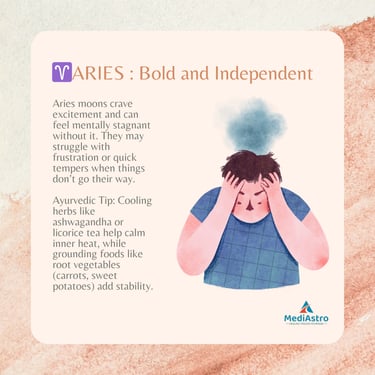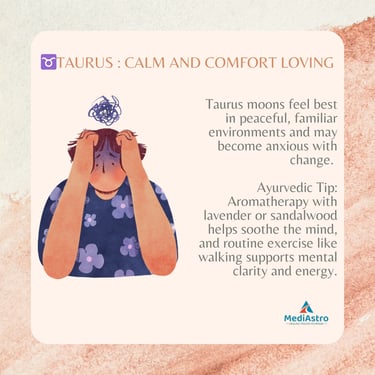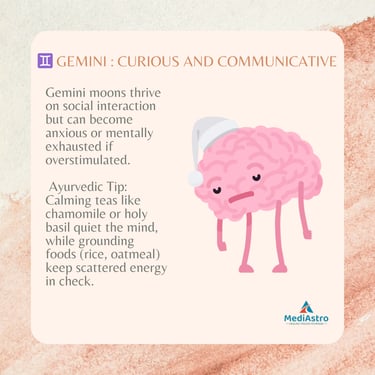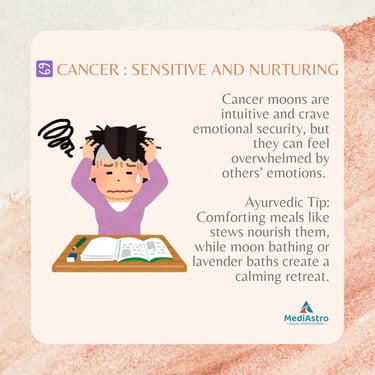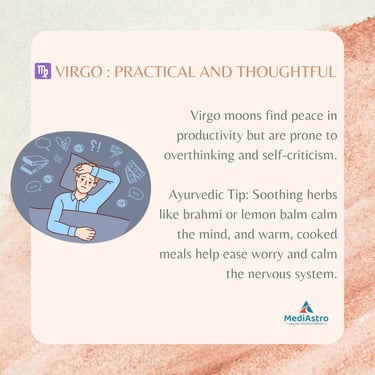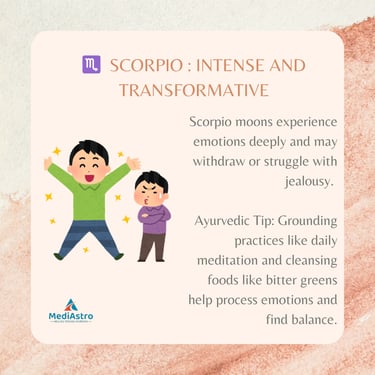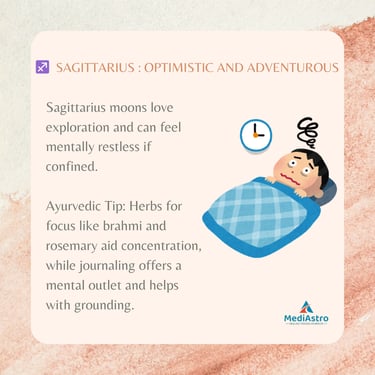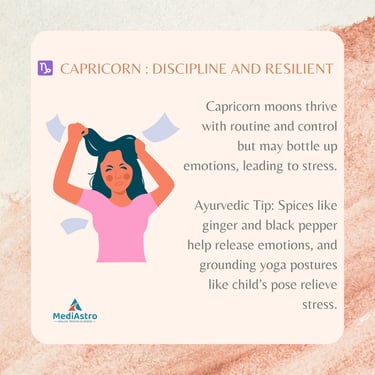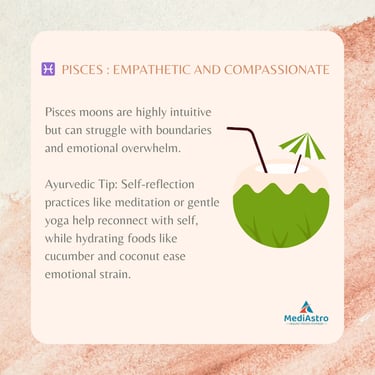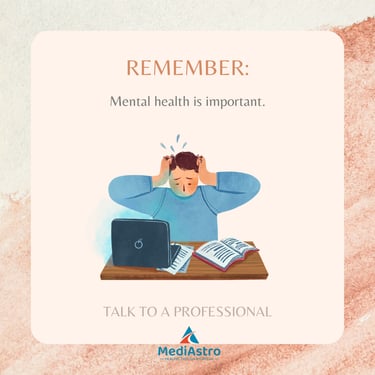How does moon sign affect mental health?
Discover how your moon sign shapes your emotional world and mental health. Learn Ayurvedic and practical tips to nurture well-being for each moon sign in this comprehensive guide.
Ayurvedic and Practical Remedies for Emotional Well-Being
Mental health is at the forefront of health concerns worldwide. In a rapidly changing world, stress, anxiety, and depression are increasingly common. Factors such as demanding work environments, social pressures, and the prevalence of social media contribute to our mental struggles.
According to a recent report by the World Health Organisation approximately 1 in 8 people, or 970 million people globally, struggle with a mental health disorder, with anxiety and depression being the most prevalent.
Fortunately, ancient Ayurvedic practices, coupled with practical, modern methods, offer a roadmap to emotional resilience.
The State of Mental Health Today
The World Health Organization (WHO) estimates that nearly 1 billion people globally are affected by mental health issues, with anxiety and depression being the most common. Factors like work-related stress, loneliness, social media’s impact on self-esteem, and the unpredictable global landscape add fuel to the fire. Younger generations, in particular, are affected, with mental health issues beginning as early as adolescence.
How does my moon sign affect mental health?
When it comes to mental health, astrology can be surprisingly insightful. While our sun sign describes our outward personality, our moon sign represents our inner emotional landscape—the part of us that craves security, affection, and understanding. In astrology, the moon governs our emotions and subconscious, shaping how we process feelings, react to stress, and seek comfort.
Have a look in these images created by our team:
Ayurvedic and Practical Remedies for Mental Health
BONUS! Here are 8 both modern and traditional approaches, including those in Ayurveda, which emphasize the power of routine, mindfulness, diet, and self-care to maintain emotional balance.
1. Embrace a Routine for Mental Stability
One of the cornerstones of Ayurveda is dinacharya, or daily routine. Routines create a sense of predictability, which is calming to the nervous system.
Tips:
Set a Regular Sleep Schedule: Aim to wake up and sleep at the same time daily. Consistent sleep patterns can stabilize mood and reduce anxiety.
Poor sleep can increase the risk of mental health issues by 60%. Around 35% of adults in the U.S. get less than the recommended 7 hours of sleep per night (Centers for Disease Control and Prevention).
Morning Mindfulness: Start the day with a 5-10 minute meditation or journaling session to set intentions.
Evening Unwinding: Avoid screens at least an hour before bed. Try reading or listening to soothing music to relax the mind.
2. Practice Breathwork and Meditation for Stress Relief
In Ayurveda, pranayama (breathing exercises) and meditation are invaluable for calming the mind. Studies have shown that even a few minutes of mindful breathing can reduce cortisol levels, the body’s stress hormone.
Tips :
Deep Belly Breathing : Try 5-10 minutes of deep, slow breaths, inhaling through the nose and exhaling through the mouth. This can be particularly helpful during moments of stress.
Mindfulness Meditation: Dedicate at least 5 minutes daily to mindfulness practices. Apps like Headspace or Calm can guide beginners.
3. Adopt a Sattvic (Pure) Diet for Mental Clarity
Ayurveda encourages a sattvic diet (righteous), emphasizing foods that nourish the mind and promote calmness. This diet consists of fresh, organic fruits, vegetables, nuts, whole grains, and dairy, while avoiding overly processed or stimulating foods.
Tips :
Incorporate Fresh Produce: Aim for a balanced plate with fruits, vegetables, whole grains, and lean proteins. A plant-based approach can support a clear, energized mind.
Limit Caffeine and Sugar: Caffeine and refined sugar may lead to mood swings and disrupt sleep. Instead, try herbal teas like chamomile or tulsi for a calming effect.
Try Ghee and Spices: Add a small amount of ghee (clarified butter) for its nourishing properties and spices like turmeric, cumin, and coriander for digestion and mental clarity.
4. Herbs to Balance Mind and Mood
Ayurvedic herbs are powerful tools for balancing mental health. Certain adaptogens—herbs that help the body adapt to stress—have been shown to improve resilience and emotional stability.
Popular Ayurvedic Herbs for Mental Health :
Ashwagandha: Known for reducing anxiety and improving sleep quality, ashwagandha helps the body cope with stress.
Brahmi (Bacopa Monnieri): Used for centuries to support cognitive function, Brahmi is calming and helps with mental clarity.
Tulsi (Holy Basil): Tulsi is both calming and uplifting, supporting resilience against mental fatigue and stress.
How to Use: These herbs are available as powders, teas, or capsules. Consult a healthcare provider for personalized guidance, especially if you're on other medications.
5. Exercise Regularly to Boost Mood and Energy
Exercise is essential for mental health, and Ayurveda encourages movement that’s appropriate for your dosha (body-mind type).
Tips :
Vata Types (Air and Ether): Gentle exercises like yoga, walking, or tai chi are grounding and help reduce anxiety.
Pitta Types(Fire and Water): Moderate-intensity activities like swimming or cycling can channel energy and reduce irritability.
Kapha Types (Earth and Water): Dynamic exercises like running, strength training, or aerobics can energize and uplift.
Aim for at least 30 minutes of physical activity daily. Exercise releases endorphins, which are natural mood lifters, and helps regulate stress
6. Practice Digital Detox and Set Boundaries
Constant exposure to screens and information overload can lead to mental fatigue. Setting boundaries with technology helps create mental space.
Tips :
Limit Social Media Time: Set specific times for checking social media and avoid it before bedtime.
Studies show a correlation between increased social media use and higher levels of anxiety, depression, and sleep disturbances, especially among teens. Over 40% of users aged 18-24 reported feeling pressure to present a “perfect” image online read more...
Digital-Free Zones: Create screen-free zones in the house, like the dining area, to promote mindful eating and conversation.
Practice Presence: During family time or relaxation, put devices away and focus on the present moment.
7. Connect with Nature to Rejuvenate the Mind
Ayurveda teaches that spending time in nature rebalances our energies and calms the mind. Nature is known to lower cortisol levels and improve mood.
Tips :
Take Daily Walks Outside: Even a 10-15 minute walk can have a calming effect.
Engage in Grounding Activities: Activities like gardening or simply sitting in the sun help reduce mental clutter.
Forest Bathing: Practice mindful walking in a natural setting to experience a deeper connection with the environment.
8. Express Creativity as Emotional Therapy
Creativity is a very powerful outlet for emotional expression and is highly encouraged in Ayurveda as a way to release pent-up emotions and cultivate joy.
Putting emotions into hobbies such as playing instruments, painting etc... can be a really powerful stress buster.
Conclusion
Addressing today’s mental health crisis requires a holistic approach, blending modern strategies with ancient wisdom. Ayurveda’s practices—mindfulness, diet, herbal remedies, and lifestyle adjustments—support emotional balance and resilience. By integrating these approaches, we can create a foundation of mental wellness that helps us navigate life’s challenges with clarity and peace.
Remember, small, consistent steps in self-care make a profound difference. Embrace these Ayurvedic and practical tips, and take your mental health journey one day at a time.

